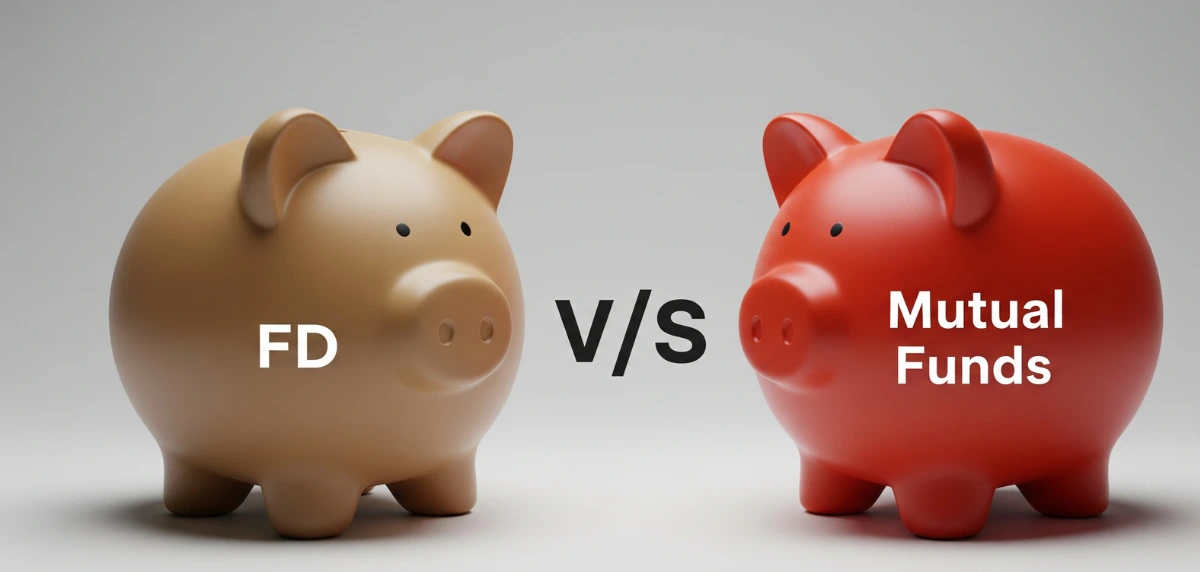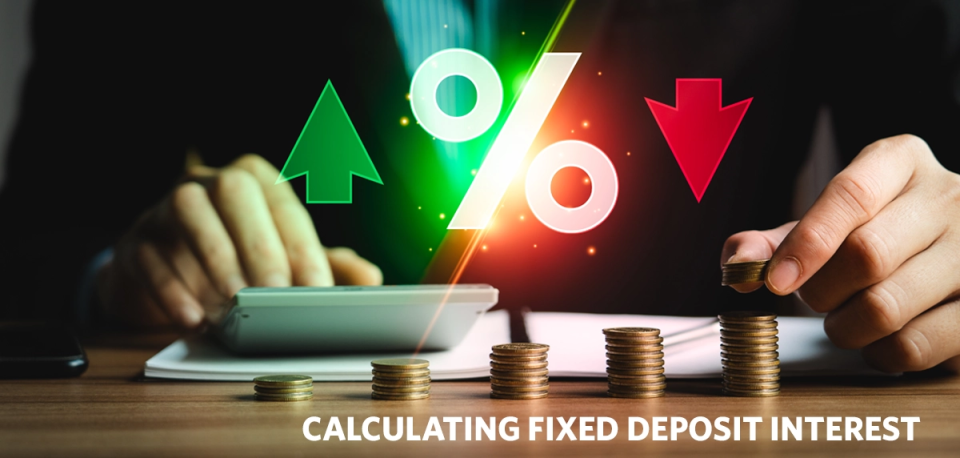Whether it be to put your surplus funds to good use or to ensure that you future is secure against inflation, investing is a vital step in your financial journey. Investors in India can choose from a range of avenues to suit different goals and risk appetites. Among the most popular choices are fixed deposits and mutual funds. However, before choosing between these options, it is important to understand their features. Here, we explore fixed deposit or mutual funds in depth. We also provide a comparison between FD and mutual funds and a comparison between mutual funds and fixed deposits. Finally, we explain how to use a fixed deposit calculator and an investment calculator to make informed decisions.
Understanding Fixed Deposits
A fixed deposit (FD) is a secure, debt-based investment offered by banks and NBFCs.
Capital Preservation:
FDs provide guaranteed returns, making them a favourite for risk-averse investors.
Fixed Tenure:
You lock in a sum for a chosen period, which can range from a few months to several years.
Steady Returns:
Interest rates are determined at the time of deposit and remain unchanged until maturity.
Liquidity:
Premature withdrawals are allowed, but they often incur a penalty.
With FDs, you know exactly how much you will receive at the end of the term. These instruments typically offer higher rates than savings accounts. Use an online fixed deposit calculator to estimate your maturity amount instantly.
Understanding Mutual Funds
A mutual fund pools money from various investors to build a diversified portfolio managed by professionals.
Diverse Choices:
Funds invest in equities, bonds, money-market instruments, or a mix (hybrid funds). You can also explore opportunities in New Fund Offers (NFOs), which allow early investment in newly launched schemes at their inception NAV.
Professional Management:
Fund managers aim to outperform market benchmarks.
Variable Returns:
Returns depend on market movements and asset performance.
Flexibility:
You can invest either as a lump sum or via a Systematic Investment Plan (SIP).
Mutual funds can suit investors seeking growth and willing to accept market volatility. To forecast potential gains, make use of an investment calculator that factors in your SIP or lump-sum inputs, tenure, and expected rate of return.
Key Differences – FD vs Mutual Funds**
Below is a mutual fund vs fixed deposit comparison across key parameters.
Parameter
| Fixed Deposits
| Mutual Funds
|
Nature
| Debt instrument. Fixed tenure and return rate.
| Pooled investment. Returns linked to asset classes.
|
Returns
| Predefined and guaranteed.
| Market-linked. May vary.
|
Risk Profile
| Low risk.
| Medium to high risk.
|
Liquidity
| Lock-in period with penalty on early withdrawal.
| No lock-in for many funds. Exit load may apply early.
|
Expenses
| No management fees.
| Annual Expense Ratio and possible exit loads.
|
Taxation
| Taxed as per income slab.
| Equity funds offer long-term capital gains benefits.
|
Investment Mode
| Lump sum only.
| Lump sum or SIP.
|
Regulation
| Regulated by RBI.
| Regulated by SEBI.
|
Inflation Impact
| Returns fixed; may lag behind inflation.
| Potential to beat inflation.
|
Investment Access
| Bank branch or NBFC portal.
| Asset Management Company platforms and distributors.
|
This comparison between FDs and mutual funds highlights that FDs deliver certainty. In contrast, mutual funds can offer higher growth potential but with volatility.
Who Should Consider an FD?
When deciding which is better, FD or mutual fund, ask yourself about your comfort with risk and your financial objectives. Fixed deposits are ideal for:
Conservative Investors:
Those who prefer capital protection over high returns.
Regular Income Seekers:
Senior citizens who need a stable post-retirement income.
Tax-Bracketed Individuals:
Investors in higher tax slabs use FDs to match their tax liabilities.
Savings Habit Builders:
Homemakers and others forming an investment routine.
If you value stability and guaranteed interest, an FD may be your best choice.
Who Should Consider Mutual Funds?
For those who can tolerate market swings, mutual funds often outperform bank deposits over the long run. Consider equity or hybrid funds if you:
Seek Higher Returns:
Willing to accept periodic dips for potentially greater gains.
Desire Diversification:
Want to spread risk across various sectors and instruments.
Aim to Beat Inflation:
Seek growth that keeps pace with or exceeds inflation.
Prefer Flexibility:
Need the option to switch between schemes or adjust SIP amounts.
The choice between an FD or mutual fund need not be binary. Many investors adopt a mixed approach, using FDs for short-term safety and mutual funds for long-term growth.
Using Calculators to Decide
In today’s digital age, online tools simplify your planning:
Fixed Deposit Calculator:
Enter your principal, tenure and interest rate to see maturity value. It helps you choose the right FD tenor for your goals.
Investment Calculator:
For mutual funds, this tool factors in SIP amount, investment horizon and expected returns. It clearly shows how periodic investments can compound.
Regularly updating these inputs can keep your strategy aligned with changing rates and goals. Such tools demystify complex computations and support informed choices.
Crafting a Balanced Portfolio
Rather than viewing this as a strict FD vs mutual funds contest, think of combining both. A balanced portfolio might include:
Short-term Cash Needs:
Bank FDs with tenures matching your expense timeline.
Long-term Growth:
Equity or hybrid mutual funds with a horizon of at least five years.
Emergency Fund:
Debt mutual funds or short-term FDs that mature when you need liquidity.
This approach can smooth returns and manage risk. You preserve capital in the short term while participating in market growth over the long term.
Regular Portfolio Review
Investments are not a “set and forget” endeavour. Review your portfolio regularly.
Rebalance:
Shift allocations if equity funds have grown too large relative to FDs.
Rate Check:
Compare current FD rates to your locked-in rates to decide if rolling over makes sense.
Goal Alignment:
Ensure your investments still match your financial milestones like home purchase, child’s education, or retirement.
Regularly reviewing your investment keeps you proactive. It lets you capture new opportunities and protect against shifting market conditions, ensuring your strategy remains on track.
Understanding mutual fund vs. fixed deposit dynamics empowers you to choose wisely. Fixed deposits offer peace of mind with guaranteed returns. Mutual funds provide growth potential and diversification benefits. Use a fixed deposit calculator and an investment calculator to tailor your investments. Ultimately, FD or mutual fund which is better depends on your risk tolerance, time horizon and financial aims. For many, the optimal strategy is a combination of both. By blending safety and growth, you can build a resilient portfolio that serves your needs today and in the future.
** Tax exemptions are as per applicable tax laws from time to time.
























